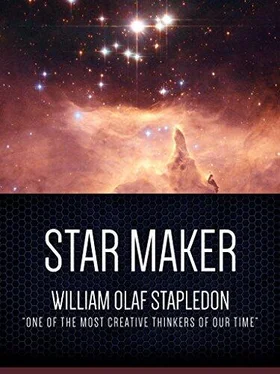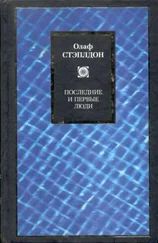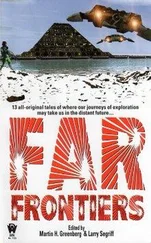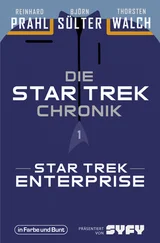One aspect of the communal experience of the explorers I have still to mention. Each of us had originally set out upon the great adventure mainly in the hope of discovering what part was played by community in the cosmos as a whole. This question had yet to be answered; but meanwhile another question was becoming increasingly insistent. Our crowded experiences in the many worlds, and our new lucidity of mind, had bred in each of us a sharp conflict of intellect and feeling. Intellectually the idea that some "deity," distinct from the cosmos itself, had made the cosmos now seemed to us less and less credible. Intellectually we had no doubt that the cosmos was self-sufficient, a system involving no logical ground and no creator. Yet increasingly, as a man may feel the psychical reality of a physically perceived beloved or a perceived enemy, we felt in the physical presence of the cosmos the psychical presence of that which we had named the Star Maker. In spite of intellect, we knew that the whole cosmos was infinitely less than the whole of being, and that the whole infinity of being underlay every moment of the cosmos. And with unreasoning passion we strove constantly to peer behind each minute particular event in the cosmos to see the very features of that infinity which, for lack of a truer name, we had called the Star Maker. But, peer as we might, we found nothing. Though in the whole and in each particular tiling the dread presence indubitably confronted us, its very infinity prevented us from assigning to it any features whatever.
Sometimes we inclined to conceive it as sheer Power, and symbolized it to' ourselves by means of all the myriad power-deities of our many worlds. Sometimes we felt assured that it was pure Reason, and that the cosmos was but an exercise of the divine mathematician. Sometimes Love seemed to us its essential character, and we imagined it with the forms of all the Christs of all the worlds, the human Christs, the Echino-derm and Nautiloid Christs, the dual Christ of the Sym-biotics, the swarming Christ of the Insectoids. But equally it appeared to us as unreasoning Creativity, at once blind and subtle, tender and cruel, caring only to spawn and spawn the infinite variety of beings, conceiving here and there among a thousand inanities a fragile loveliness. This it might for a while foster with maternal solicitude, till in a sudden jealousy of the excellence of its own creature, it would destroy what it had made.
But we knew well that all these fictions were very false. The felt presence of the Star Maker remained unintelligible, even though it increasingly illuminated the cosmos, like the splendor of the unseen sun at dawn.
CHAPTER IX
THE COMMUNITY OF WORLDS
I. BUSY UTOPIAS
THERE came a time when our new-found communal mind attained such a degree of lucidity that it was able to maintain contact even with worlds that had passed far beyond the mentality of terrestrial man. Of these lofty experiences I, who am once more reduced to the state of a mere individual human being, have only the most confused memory. I am like one who, in the last extremity of mental fatigue, tries to recapture the more penetrating intuitions that he achieved in his lost freshness. He can recover only faint echoes and a vague glamour. But even the most fragmentary recollections of the cosmical experiences which befell me in that lucid State deserve recording.
The sequence of events in the successfully waking world was generally more or less as follows. The starting point, it will be remembered, was a plight like that in which our own Earth now stands. The dialectic of the world's history had confronted the race with a problem with which the traditional mentality could never cope. The world-situation had grown too complex for lowly intelligences, and it demanded a degree of individual integrity in leaders and in led, such as was as yet possible only to a few minds. Consciousness had already been violently awakened out of the primitive trance into a state of excruciating individualism, of poignant but pitifully restricted self-awareness. And individualism, together with the traditional tribal spirit, now threatened to wreck the world. Only after a long-drawn agony of economic distress and maniac warfare, haunted by an increasingly clear vision of a happier world, could the second stage of waking be achieved. In most cases it was not achieved. "Human nature," or its equivalent in the many worlds, could not change itself; and the environment could not remake it.
But in a few worlds the spirit reacted to its desperate plight with a miracle. Or, if the reader prefers, the environment miraculously refashioned the spirit. There occurred a widespread and almost sudden waking into a new lucidity of consciousness and a new integrity of will. To call this change miraculous is only to recognize that it could not have been scientifically predicted even from the fullest possible knowledge of "human nature" as manifested in the earlier age. To later generations, however, it appeared as no miracle but as a belated wakening from an almost miraculous stupor into plain sanity.
This unprecedented access of sanity took at first the form of a wide-spread passion for a new social order which should be just and should embrace the whole planet. Such a social fervor was not, of course, entirely new. A small minority had long ago conceived it, and had haltingly tried to devote themselves to it. But now at last, through the scourge of circumstance and the potency of the spirit itself, this social, will became general. And while it was still passionate, and heroic action was still possible to the precariously awakened beings, the whole social structure of the world was reorganized, so that within a generation or two every individual on the planet could count upon the means of life, and the opportunity to exercise his powers fully, for his own delight and for the service of the world community. It was now possible to bring up the new generations to a sense that the world-order was no alien tyranny but an expression of the general will, and that they had indeed been born into a noble heritage, a thing for which it was good to live and suffer and die. To readers of this book such a change may well seem miraculous, and such a state Utopian.
Those of us who had come from less fortunate planets found it at once a heartening and yet a bitter experience to watch world after world successfully emerge from a plight which seemed inescapable, to see a world-population of frustrated and hate-poisoned creatures give place to one in which every individual was generously and shrewdly nurtured, and therefore not warped by unconscious envy and hate. Very soon, though no change had occurred in the biological stock, the new social environment produced a world population which might well have seemed to belong to a new species. In physique, in intelligence, in mental independence and social responsibility, the new individual far outstripped the old, as also in mental wholesomeness and in integrity of will. And though it was sometimes feared that the removal of all sources of grave mental conflict might deprive the mind of all stimulus to creative work, and produce a mediocre population, it was soon found that, far from stagnating, the spirit of the race now passed on to discover new fields of struggle and triumph. The world-population of "aristocrats," which flourished after the great change, looked back with curiosity and incredulity into the preceding age, and found great difficulty in conceiving the tangled, disreputable and mostly unwitting motives which were the main-springs of action even in the most fortunate individuals among their ancestors. It was recognized that the whole pre-revolutionary population was afflicted with serious mental diseases, with endemic plagues of delusion and obsession, due to mental malnutrition and poisoning. As psychological insight advanced, the same kind of interest was aroused by the old psychology as is wakened in modern Europeans by ancient maps which distort the countries of the world almost beyond recognition. We were inclined to think of the psychological crisis of the waking worlds as being the difficult passage from adolescence to maturity; for in essence it was an outgrowing of juvenile interests, a discarding of toys and childish games, and a discovery of the interests of adult life. Tribal prestige, individual dominance, military glory, industrial triumphs lost their obsessive glamour, and instead the happy creatures delighted in civilized social intercourse, in cultural activities, and in the common enterprise of world-building. During the phase of history which followed the actual surmounting of the spiritual crisis in a waking world the attention of the race was of course still chiefly occupied with social reconstruction. Many heroic tasks had to be undertaken. There was need not only for a new economic system but for new systems of political organization, of world-law, of education. In many cases this period of reconstruction under the guidance of the new mentality was itself a time of serious conflict. For even beings who are sincerely in accord about the goal of social activity may disagree violently about the way. But such conflicts as arose, though heated, were of a very different kind from the earlier conflicts which were inspired by obsessive individualism and obsessive group-hatreds.
Читать дальше









![Олаф Стэплдон - Создатель звезд [сборник litres]](/books/433148/olaf-stepldon-sozdatel-zvezd-sbornik-litres-thumb.webp)


